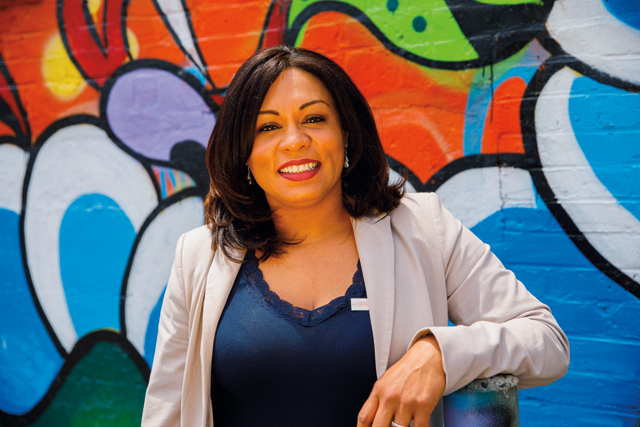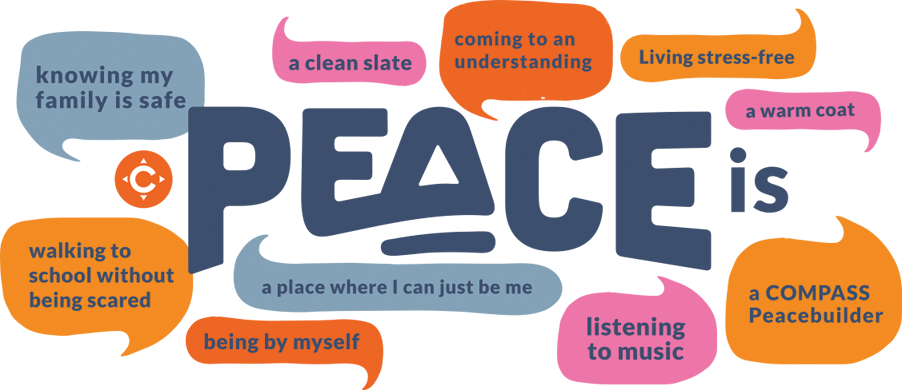Guiding the way
COMPASS Youth Collaborative, led by CEO Jackie Santiago Nazario ’00, builds relationships with Hartford’s young people
By Rhea Hirshman
Photos by FJ Gaylor Photography
On a summer Saturday evening in 2019, more than 80,000 people gathered in Hartford to view the fireworks and to celebrate Independence Day with neighbors, friends, and families. Among them were a cadre of young people known as Peacebuilders—ambassadors for nonviolence from Hartford’s COMPASS Youth Collaborative—who walked through the crowd distributing food vouchers for the children and a message of calm and consideration for everyone.
“That evening,” says Jacquelyn “Jackie” Santiago Nazario ’00, COMPASS’s CEO, “we did not have a single violent incident.”
Having grown up in the projects of Lawrence, Massachusetts, she understands firsthand the lives of those COMPASS serves. Since her days as a student at Trinity College, Santiago Nazario, who majored in sociology, has dedicated herself to helping young people turn away from violence to rebuild their lives and help restore their communities.

“What I most appreciate about Jackie is not just what she does, but how,” says Thea Montañez, chief operating officer for the City of Hartford. “She leads with humility. I saw that quality firsthand when she worked side by side with her team and our police to prevent violence at that Independence Day event. Her willingness to do whatever it takes, no matter when or where, is critical to building a safer and stronger Hartford.”
Santiago Nazario first found her calling during her sophomore year at Trinity College with an internship at Hartford Areas Rally Together (HART). Working primarily with the South End Knight Riders Youth Center, she continued that internship through her senior year and then accepted a job offer with the organization, which later became COMPASS Youth Collaborative. “I had had every intention of going back to Lawrence,” she says, “but remained in Hartford so I could continue working with the kids I had connected to.”
The pull of her hometown and family almost derailed Santiago Nazario’s Trinity career in her sophomore year when she came close to failing out. “That would have been the saddest day of my life,” she says. “But I had been doing a lot of caretaking for my family and felt that I had to keep going back and forth.” A conversation with the now-deceased David Winer, dean of students and professor of psychology, made the difference. “When he pointed out that I had a choice to make and could not live my family’s lives for them, I was furious,” she says. “I sat on our conversation for a week and then told him he was right—and recommitted to myself and my education.”
That tension between her two worlds felt familiar. During the fifth grade in Lawrence schools, Santiago Nazario was recruited to The Pike School, an independent middle school in Andover—20 minutes and light years away. When she entered the following year, the culture shock was profound. Each day, she arrived at a place where hardly anyone looked like her. She went from being an “A” student to struggling academically. “I lost my voice. I was scared to say anything because I was so different,” she says. “I wanted to go back to where I was comfortable. But my mother kept telling me, ‘You don’t understand now, but you have to stay and try your hardest.’ ”
She did stay and began to thrive, picking up books (“It was the first time I read challenging books like The Color Purple,” she says), researching her own African roots, playing sports, and, by ninth grade, feeling like she could speak to almost anyone. She received a scholarship to Pingree School, an independent high school an hour away by bus and, again, a universe away from home. She worked tirelessly on her academics and involved herself fully in school life. “I chose what would give me the most opportunity, even though it was hard,” she says. “I could see the advantages of the education, but I never belonged fully in either world.”
 Santiago Nazario credits teachers in both schools for helping her persevere. “They went out of their way. They picked me up on weekends to take me to their homes for extra help. They were invested in me. And that fact gave me the strength to keep moving forward.”
Santiago Nazario credits teachers in both schools for helping her persevere. “They went out of their way. They picked me up on weekends to take me to their homes for extra help. They were invested in me. And that fact gave me the strength to keep moving forward.”
When the time came to think about college, Santiago Nazario balked. “No one in my family had ever been to college. I was thinking of not applying. I wanted to work and help my family. From when I was very young, I was the responsible one, the glue that held everything together.” When her Pingree guidance counselor finally persuaded her to look at schools, she focused on those near home. When he suggested Trinity as a good match, Santiago Nazario’s response was, “But Connecticut is two hours away!”
The combination of the counselor’s support, her own research, and accelerating difficulties at home persuaded Santiago Nazario to apply. Her interactions with staff during an accepted-students weekend motivated her to enroll. “I remember getting to campus on move-in day,” she says. “My parents were crying, and I realized that I wasn’t going back with them and that this was my new home. I made it my mission from day one to connect and build relationships.”
Early on, Santiago Nazario explored the surrounding neighborhood, where she found streets that resembled the ones she grew up with and restaurants with familiar foods. At the same time, she threw herself into college life, joining several student-of-color organizations, becoming a tour guide and a senior interviewer, cheerleading, and working in the Admissions and Development Offices.
She also helped make Trinity history when several student-of-color organizations collectively challenged the College’s strategic plan. The new map, they noticed, did not include any of the existing cultural houses. “I was on the cover of the Student Handbook,” she says, “and [yet] the administration was planning to tear down the gathering places for students of color.” Supported by alumni and with advice from professors, students confronted then-President Evan Dobelle with their demands, including preservation of the cultural houses, the addition of African American studies to the curriculum, and the hiring of a dean for multicultural affairs.
“It took a lot of work, but we succeeded,” says Santiago Nazario. “I learned a lot about myself and about building coalitions and taking responsibility in a community. That experience has stayed with me and is still one of my proudest moments.”
Since 2019, Santiago Nazario, who also has a master’s in organizational leadership from Quinnipiac University, has led the organization where she began as a Trinity intern.

The signature work of COMPASS is the Peacebuilders program, implemented in 2007 to reach Hartford youth at risk of perpetrating or becoming victims of violence—often both. Each year, Peacebuilders engage more than 200 individuals ages 16–24 who are disconnected from school, families, and community. Outreach teams, some of whom are former gang members, mediate conflicts and disrupt violence through training and relationship building, promote nonviolent problem-solving, provide youth with life skills to decrease involvement with the juvenile justice system, and build positive coalitions. The teams also encourage youth to join the full four-year Peacebuilders program, staffed by social workers and other professionals who provide the support needed for success in education, employment, and life.
“Our relationships with individuals—youth, families, school personnel, police and probation officers, social workers, medical providers—make the difference.” Santiago Nazario says. “Team members go wherever they are needed: the streets, hospital emergency rooms, juvenile detention centers, schools. They do not wear bulletproof vests. Because they are visible in the community in times of peace, they are recognized and trusted, and we have never had a Peacebuilder hurt.”
The work is both enormously rewarding and intensely challenging. As she supports her staff, Santiago Nazario also works to humanize the population they serve. She notes that while people love to invest in “cute little kids learning to read,” the reaction is different when she talks about a 17-year-old driver of violence who may carry a weapon. “A big part of my job is changing the narrative,” she says. “There are so many systemic reasons kids become involved with violence. These are traumatized youth who often have tremendous potential, and we can’t forget about them because they were born, like I was, into the wrong zip code.”
Find out more about COMPASS at https://compassyc.org/
